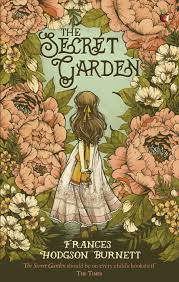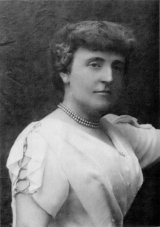The Secret Garden Page #26
The Secret Garden is a novel by Frances Hodgson Burnett first published in book form in 1911, after serialization in The American Magazine. Set in England, it is one of Burnett's most popular novels and seen as a classic of English children's literature. Several stage and film adaptations have been made.
“I am going to find out what it is,” she said. “Everybody is in bed and I don’t care about Mrs. Medlock—I don’t care!” There was a candle by her bedside and she took it up and went softly out of the room. The corridor looked very long and dark, but she was too excited to mind that. She thought she remembered the corners she must turn to find the short corridor with the door covered with tapestry—the one Mrs. Medlock had come through the day she lost herself. The sound had come up that passage. So she went on with her dim light, almost feeling her way, her heart beating so loud that she fancied she could hear it. The far-off faint crying went on and led her. Sometimes it stopped for a moment or so and then began again. Was this the right corner to turn? She stopped and thought. Yes it was. Down this passage and then to the left, and then up two broad steps, and then to the right again. Yes, there was the tapestry door. She pushed it open very gently and closed it behind her, and she stood in the corridor and could hear the crying quite plainly, though it was not loud. It was on the other side of the wall at her left and a few yards farther on there was a door. She could see a glimmer of light coming from beneath it. The Someone was crying in that room, and it was quite a young Someone. So she walked to the door and pushed it open, and there she was standing in the room! It was a big room with ancient, handsome furniture in it. There was a low fire glowing faintly on the hearth and a night light burning by the side of a carved four-posted bed hung with brocade, and on the bed was lying a boy, crying fretfully. Mary wondered if she was in a real place or if she had fallen asleep again and was dreaming without knowing it. The boy had a sharp, delicate face the color of ivory and he seemed to have eyes too big for it. He had also a lot of hair which tumbled over his forehead in heavy locks and made his thin face seem smaller. He looked like a boy who had been ill, but he was crying more as if he were tired and cross than as if he were in pain. Mary stood near the door with her candle in her hand, holding her breath. Then she crept across the room, and, as she drew nearer, the light attracted the boy’s attention and he turned his head on his pillow and stared at her, his gray eyes opening so wide that they seemed immense. “Who are you?” he said at last in a half-frightened whisper. “Are you a ghost?” “No, I am not,” Mary answered, her own whisper sounding half frightened. “Are you one?” He stared and stared and stared. Mary could not help noticing what strange eyes he had. They were agate gray and they looked too big for his face because they had black lashes all round them. “No,” he replied after waiting a moment or so. “I am Colin.” “Who is Colin?” she faltered. “I am Colin Craven. Who are you?” “I am Mary Lennox. Mr. Craven is my uncle.” “He is my father,” said the boy. “Your father!” gasped Mary. “No one ever told me he had a boy! Why didn’t they?” “Come here,” he said, still keeping his strange eyes fixed on her with an anxious expression. She came close to the bed and he put out his hand and touched her. “You are real, aren’t you?” he said. “I have such real dreams very often. You might be one of them.” Mary had slipped on a woolen wrapper before she left her room and she put a piece of it between his fingers. “Rub that and see how thick and warm it is,” she said. “I will pinch you a little if you like, to show you how real I am. For a minute I thought you might be a dream too.” “Where did you come from?” he asked. “From my own room. The wind wuthered so I couldn’t go to sleep and I heard someone crying and wanted to find out who it was. What were you crying for?” “Because I couldn’t go to sleep either and my head ached. Tell me your name again.” “Mary Lennox. Did no one ever tell you I had come to live here?” He was still fingering the fold of her wrapper, but he began to look a little more as if he believed in her reality. “No,” he answered. “They daren’t.” “Why?” asked Mary. “Because I should have been afraid you would see me. I won’t let people see me and talk me over.” “Why?” Mary asked again, feeling more mystified every moment. “Because I am like this always, ill and having to lie down. My father won’t let people talk me over either. The servants are not allowed to speak about me. If I live I may be a hunchback, but I shan’t live. My father hates to think I may be like him.” “Oh, what a queer house this is!” Mary said. “What a queer house! Everything is a kind of secret. Rooms are locked up and gardens are locked up—and you! Have you been locked up?” “No. I stay in this room because I don’t want to be moved out of it. It tires me too much.” “Does your father come and see you?” Mary ventured. “Sometimes. Generally when I am asleep. He doesn’t want to see me.” “Why?” Mary could not help asking again. A sort of angry shadow passed over the boy’s face. “My mother died when I was born and it makes him wretched to look at me. He thinks I don’t know, but I’ve heard people talking. He almost hates me.” “He hates the garden, because she died,” said Mary half speaking to herself. “What garden?” the boy asked. “Oh! just—just a garden she used to like,” Mary stammered. “Have you been here always?” “Nearly always. Sometimes I have been taken to places at the seaside, but I won’t stay because people stare at me. I used to wear an iron thing to keep my back straight, but a grand doctor came from London to see me and said it was stupid. He told them to take it off and keep me out in the fresh air. I hate fresh air and I don’t want to go out.” “I didn’t when first I came here,” said Mary. “Why do you keep looking at me like that?” “Because of the dreams that are so real,” he answered rather fretfully. “Sometimes when I open my eyes I don’t believe I’m awake.” “We’re both awake,” said Mary. She glanced round the room with its high ceiling and shadowy corners and dim fire-light. “It looks quite like a dream, and it’s the middle of the night, and everybody in the house is asleep—everybody but us. We are wide awake.” “I don’t want it to be a dream,” the boy said restlessly. Mary thought of something all at once. “If you don’t like people to see you,” she began, “do you want me to go away?” He still held the fold of her wrapper and he gave it a little pull. “No,” he said. “I should be sure you were a dream if you went. If you are real, sit down on that big footstool and talk. I want to hear about you.” Mary put down her candle on the table near the bed and sat down on the cushioned stool. She did not want to go away at all. She wanted to stay in the mysterious hidden-away room and talk to the mysterious boy. “What do you want me to tell you?” she said. He wanted to know how long she had been at Misselthwaite; he wanted to know which corridor her room was on; he wanted to know what she had been doing; if she disliked the moor as he disliked it; where she had lived before she came to Yorkshire. She answered all these questions and many more and he lay back on his pillow and listened. He made her tell him a great deal about India and about her voyage across the ocean. She found out that because he had been an invalid he had not learned things as other children had. One of his nurses had taught him to read when he was quite little and he was always reading and looking at pictures in splendid books.
Translation
Translate and read this book in other languages:
Select another language:
- - Select -
- 简体中文 (Chinese - Simplified)
- 繁體中文 (Chinese - Traditional)
- Español (Spanish)
- Esperanto (Esperanto)
- 日本語 (Japanese)
- Português (Portuguese)
- Deutsch (German)
- العربية (Arabic)
- Français (French)
- Русский (Russian)
- ಕನ್ನಡ (Kannada)
- 한국어 (Korean)
- עברית (Hebrew)
- Gaeilge (Irish)
- Українська (Ukrainian)
- اردو (Urdu)
- Magyar (Hungarian)
- मानक हिन्दी (Hindi)
- Indonesia (Indonesian)
- Italiano (Italian)
- தமிழ் (Tamil)
- Türkçe (Turkish)
- తెలుగు (Telugu)
- ภาษาไทย (Thai)
- Tiếng Việt (Vietnamese)
- Čeština (Czech)
- Polski (Polish)
- Bahasa Indonesia (Indonesian)
- Românește (Romanian)
- Nederlands (Dutch)
- Ελληνικά (Greek)
- Latinum (Latin)
- Svenska (Swedish)
- Dansk (Danish)
- Suomi (Finnish)
- فارسی (Persian)
- ייִדיש (Yiddish)
- հայերեն (Armenian)
- Norsk (Norwegian)
- English (English)
Citation
Use the citation below to add this book to your bibliography:
Style:MLAChicagoAPA
"The Secret Garden Books." Literature.com. STANDS4 LLC, 2024. Web. 26 Nov. 2024. <https://www.literature.com/book/the_secret_garden_427>.




Discuss this The Secret Garden book with the community:
Report Comment
We're doing our best to make sure our content is useful, accurate and safe.
If by any chance you spot an inappropriate comment while navigating through our website please use this form to let us know, and we'll take care of it shortly.
Attachment
You need to be logged in to favorite.
Log In